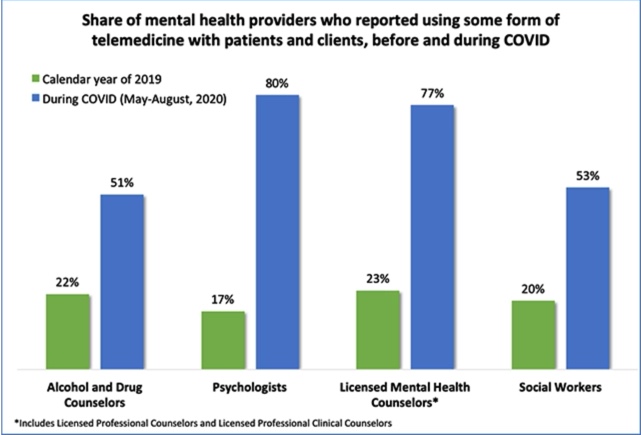Mental health providers in Minnesota deem telemedicine convenient and beneficial
For Minnesota and so many other states, the pandemic has accelerated the use of remote health care access (telemedicine). This has been due to a couple of factors. For one, before the coronavirus licensing and other requirements made telemedicine less viable as an option. There was additionally less need for patients and doctors to connect remotely.
With Covid-19, the need for social distancing made remote health care visits a necessity. And licensing changes made during the period made it possible for people to access health care remotely. In Minnesota, Governor Walz waived licensing requirements so that out-of-state mental health providers can assist Minnesotan residents. Since then, mental health providers in Minnesota have embraced telemedicine and they deem it very beneficial and convenient.

Source: Minnesota Department of Health
A lot of patients and providers like the convenience of telemedicine
A lot of patients and doctors are touting the benefits of remote connection, as reported by Minnpost,
Richard Sethre, Psy.D., retired from his longtime psychology practice this spring. As he was nearing retirement, he made the decision to transition most of his practice to telemedicine. An early adopter to technology, he saw the benefits of virtual counseling sessions, and most of his patients, after initially expressing concern that telehealth could limit the therapeutic relationship, got on board with the change.
“At first, several of my patients commented, ‘This is really different,’” Sethre said. “Later, they also commented in effect, ‘Gee, this is going great. I love the convenience. I want to keep doing this.’ They reported very little negative difference between in-person treatment and telehealth.”
The majority of providers intend to use telemedicine after covid is over
Teri Fritsma, a Senior Research Analyst at for the Minnesota Department of Health Office of Rural Health and Primary Care, and her colleagues polled licensed mental healthcare providers to find out how many of them would continue to use telemedicine after Covid-19 is over. The findings reveal that telemedicine might remain a permanent part of mental health care providers in Minnesota.
“Of the providers that are using telemedicine right now, a huge majority of them told us they plan to continue using telemedicine after the pandemic ends,” she said. “Most believe that it is here to stay.”
When asked if they intend to continue offering at least some services via telemedicine post-COVID, the majority of the state’s mental health providers — 75 percent of licensed alcohol and drug counselors, 85 percent of psychologists, 88 percent of mental health counselors and 79 percent of social workers — said they would. Once they had a taste of the convenience and options that telehealth offers, it appears hard to look back.
Fritsma compared the experience of offering telemedicine to her own work-from-home life during the pandemic: “Think about how easy it is in so many ways to not go into the office. The telehealth option encourages all sorts of providers to be able to offer care who might otherwise have to be out of the market, like new moms or people who are getting ready to retire but would like to continue to work full time.”
And with telehealth now established as a viable option, many providers who might have been considering retirement before may now be rethinking their futures. “This could allow people to keep a foot in the door and reach potential patients more broadly, too,” Fritsma said.
I have written before, that telemedicine is definitely a viable service for delivering care. These survey results are a testament to just how much telemedicine can improve efficiency in the provision of health care services and offer a potential remedy to in areas facing a stark shortage of health providers, like rural areas. Going forward, it is up to the Minnesota government to ensure that any regulatory changes made during the emergency period that has allowed the extensive adoption of telemedicine to be made permanent. The state should additionally rollback other existing rules hindering a more widespread use of telemedicine so that these benefits can be felt by more people.